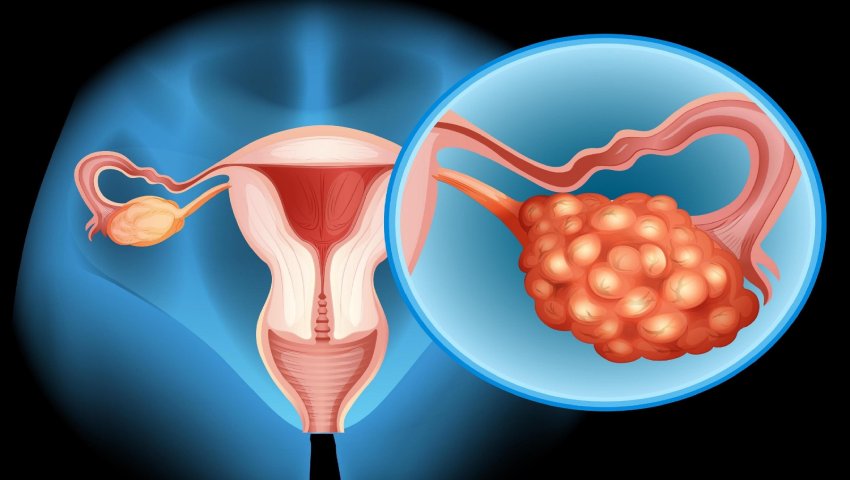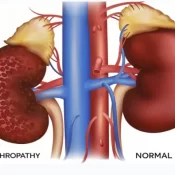
Ovarian cancer is a serious health issue affecting thousands of women in India every year. Many women do not recognize the early signs, which can delay diagnosis and treatment. At Apex Hospital, one of the Best Cancer Hospitals in PCMC, Pune, and a trusted Superspeciality Hospital in Thergaon, Pune, we understand the importance of awareness and timely care. This complete guide will help you learn about the early symptoms, risk factors, & modern treatment options for ovarian cancer available right here in Pune. Our goal is to provide clear and reliable information so women can take charge of their health & seek expert care without delay. Knowledge & early action can save lives.
What is Ovarian Cancer?
Ovarian cancer is a disease where cells in the ovaries grow out of control and form tumors. The ovaries are two small organs, each about the size of an almond, located on either side of a woman’s uterus. These organs produce eggs and important hormones like estrogen and progesterone.
When cancer develops in the ovaries, the abnormal cells multiply quickly and can spread to other parts of the body. This makes ovarian cancer particularly dangerous because it often goes undetected in its early stages. The good news is that with proper medical care at facilities like Apex Hospital, a leading Cancer Hospital in PCMC, Pune, many women can receive effective treatment.
Unlike some other cancers, ovarian cancer can affect women of any age, though it’s more common in women over 50. The disease requires specialized care from experienced Ovarian Cancer Specialists at Apex Hospital who understand the latest treatment approaches.
Early Signs and Symptoms of Ovarian Cancer:
Ovarian cancer is often called a “silent disease” because its early signs are easy to miss. Many women mistake the symptoms for common digestive issues or stress. But spotting these early signs can help in getting timely treatment.
Common Signs to Watch For:
- Bloating or Swelling in the Belly: If your stomach feels bloated all the time, even when you haven’t eaten much, it could be a warning sign.
- Feeling Full Quickly: Losing your appetite or feeling full after eating just a little may be a sign of ovarian cancer.
- Pelvic Pain or Pressure: Pain in the lower stomach or pelvis that is not linked to periods should not be ignored.
Silent Symptoms That Are Often Missed:
- Constipation or Changes in Bowel Habits
- Frequent Need to Urinate
- Back Pain Without a Clear Reason
- Unexplained Weight Loss
- Feeling Tired All the Time
These signs can be mistaken for other problems like IBS (Irritable Bowel Syndrome), but in ovarian cancer, the symptoms last longer and tend to get worse over time.
Understanding Risk Factors for Ovarian Cancer:
Ovarian cancer can affect any woman, but some factors increase the chances. Knowing these risks can help with early detection and better care.
Genetic and Family History:
Some women carry changes in genes like BRCA1 and BRCA2. These raise the risk of both ovarian and breast cancer. If your mother, sister, or grandmother had ovarian cancer, your risk may be higher.
At our Multispeciality Hospital in PCMC, Pune, we offer genetic counseling services to help women understand their risk based on family history and genetic testing.
Age and Lifestyle:
- Age matters – Ovarian cancer is more common in women over 50. Women who have never given birth or had fertility problems may face a slightly higher risk.
- Endometriosis, a condition where uterine tissue grows outside the uterus, also increases risk.
Interestingly, some lifestyle factors can reduce ovarian cancer risk. Taking birth control pills and ovarian cancer risk studies show that long-term use of oral contraceptives can lower the chances of developing this cancer.
Types and Classification of Ovarian Cancer:
Understanding the types of ovarian cancer is important to plan the right treatment. Doctors classify ovarian tumors based on where they start and how they behave.
Main Categories of Ovarian Tumours:
- Epithelial Tumours: These are the most common and start on the outer layer of the ovary. They are more likely to occur in women over 50.
- Germ Cell Tumours: These begin in the egg-producing cells and usually affect younger women. Many of them are treatable, even in later stages.
- Borderline Tumours: These are between non-cancerous and cancerous. They grow slowly and often have a better outlook.
Advanced Classification: Type 1 and Type 2:
Doctors also group ovarian cancers as:
- Type 1 Tumours – Grow slowly and are often detected early. These include low-grade serous, endometrioid, mucinous, and clear-cell types.
- Type 2 Tumours – Grow quickly and are more aggressive. High-grade serous carcinoma is the most common in this group and is often found at a late stage.
It’s also important to distinguish between an ovarian cyst vs. cancer. Most ovarian cysts are benign and cause no problems, while cancerous growths require immediate medical attention.
At Apex Hospital, our ovarian cancer specialists use these classifications to decide the best treatment for every patient. Early diagnosis and expert care can improve recovery and outcomes.
Diagnosis and Testing Methods:
Early and accurate diagnosis is key to treating ovarian cancer effectively. Here’s how doctors identify the condition using different methods.
Initial Examination Procedures:
How is ovarian cancer diagnosed? It usually starts with a detailed medical history and a physical check-up. During a pelvic exam, the doctor feels for any lumps or changes in the ovaries or nearby areas.
A transvaginal ultrasound for ovarian cancer is often the first imaging test used. It uses sound waves to show pictures of the ovaries. This helps doctors find any unusual growths that may need more testing.
Blood Tests and Biomarkers:
The CA-125 blood test for ovarian cancer checks the level of a protein linked to ovarian cancer. But it’s not always accurate. CA-125 can be high due to other issues like infection or endometriosis.
Other blood tests are done to check your overall health and how well your organs are working. These results help in planning the right treatment.
At Apex Hospital, the Best Cancer Hospital in PCMC, Pune, we use advanced tools to get a clear and early diagnosis.
Advanced Diagnostic Techniques:
In some cases, a biopsy for ovarian cancer diagnosis is needed. Doctors may remove a small sample of tissue—or sometimes the whole ovary—for testing in the lab.
Routine ovarian cancer screening guidelines do not suggest testing for women at average risk. But if you have a family history or gene mutations, your doctor might recommend regular blood tests and scans.
Comprehensive Treatment Options for Ovarian Cancer at Apex Hospital:
At Apex Hospital, we offer comprehensive treatment options for women facing ovarian cancer. Our approach combines advanced techniques and personalized care to ensure the best outcomes for our patients. If you’re looking for trusted ovarian cancer treatment in PCMC, Pune, our team is here to help.
- Surgical Interventions: Surgery is often the first step in treating ovarian cancer. It usually includes debulking surgery, where doctors remove as much of the tumor as possible. This may involve removing the ovaries, fallopian tubes, uterus, and nearby lymph nodes. Debulking surgery is vital because it increases the success of follow-up treatments like chemotherapy. At Apex Hospital, our skilled surgeons use the latest tools to perform these surgeries safely and effectively.
- Chemotherapy Protocols: After surgery, most patients receive chemotherapy. This treatment uses a mix of powerful drugs, usually a platinum-based drug like carboplatin and a taxane like paclitaxel. Treatment is done in cycles, allowing time for the body to rest and heal. The Oncology & Cancer Treatment team in Pune at Apex Hospital keeps a close watch on your progress and adjusts your treatment as needed to reduce side effects.
- Targeted Therapy Advances: Targeted therapy is a newer treatment that focuses on specific changes in cancer cells. PARP inhibitors like olaparib and niraparib are effective, especially for women with BRCA gene mutations. These medicines stop cancer cells from repairing themselves, leading to their death. They can be used for both early and recurrent ovarian cancer.
- Immunotherapy Developments: Immunotherapy is a promising option under research. It boosts your immune system to fight cancer naturally. Though still in trials, it may become an important part of future ovarian cancer treatment.
Stages and Prognosis:
Understanding Cancer Staging:
Ovarian cancer is divided into four main stages. These stages of ovarian cancer (Stage 1 to Stage 4) help doctors understand how much the cancer has spread:
- Stage 1: Cancer is only in the ovaries.
- Stage 2: It has spread to nearby organs in the pelvis.
- Stage 3: It has reached the abdomen.
- Stage 4: Cancer has spread to distant organs like the liver or lungs.
Prognosis Factors:
The outlook depends on the stage, cancer type, response to treatment, and overall health. For recurrent ovarian cancer, the time it stays away and earlier treatments matter.
Metastatic ovarian cancer treatment aims to manage symptoms and improve life quality. Apex Hospital provides advanced care for every stage.
Prevention Strategies & Risk Reduction:
There is no guaranteed way to prevent ovarian cancer, but some steps can lower your risk. Women with high genetic risk may consider prophylactic surgery to remove ovaries and fallopian tubes after having children. Taking birth control pills for several years can reduce risk but should be discussed with your doctor. Pregnancy and breastfeeding also help reduce risk.
- Genetic Counselling & Testing: If you have a family history of ovarian or breast cancer, genetic counseling is important. It helps decide if testing for BRCA gene mutations is needed and guides prevention options.
- Living with Ovarian Cancer: Chemotherapy side effects include fatigue, nausea, and hair loss. At the Ovarian Cancer Hospital in PCMC, Pune, care teams focus on managing these and improving comfort with palliative care. Emotional support through counseling and support groups is also vital.
- Related Conditions: Ovarian cancer can be confused with other conditions like endometrial cancer or cervical cancer. Knowing the differences helps in early diagnosis and treatment. Women with BRCA mutations may also have higher risks for breast cancer and related cancers.
Conclusion:
Ovarian cancer is a serious disease, but with awareness, early detection, and proper treatment, many women can achieve good outcomes. Understanding the symptoms, risk factors, and treatment options empowers women to take charge of their health and seek appropriate medical care when needed.
At Apex Hospital Multispeciality Hospital in PCMC, we’re committed to providing the highest quality Ovarian Cancer Treatment in PCMC, Pune. Our experienced team, advanced facilities, and comprehensive approach to care make us a trusted choice for cancer treatment in the region. If you have concerns about ovarian cancer or need expert medical care, don’t hesitate to contact us +91 98341 50838 our Ovarian Cancer Specialists at Apex Hospital.










